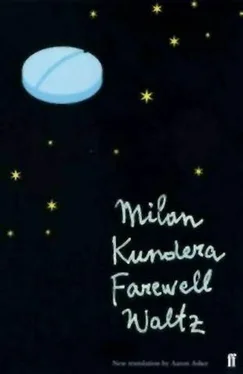"No, I'll never agree to get rid of it," Ruzena repeated. "And you too, someday, you'll be happy to have it. Because, you understand, I'm not asking you for anything at all. I hope you don't imagine I want something from you. You can absolutely set your mind at rest. This concerns only me, and if you wish, you don't have to deal with any of it."
Nothing makes a man more anxious than such reassurances. Klima suddenly felt that he had no strength left to salvage anything at all and that he had better give up the game. He was silent and Ruzena was silent too, and the words she had just spoken became so rooted in the silence that the trumpeter felt more and more miserable and helpless in their presence.
But the image of his wife suddenly came to mind. He realized that he must not give up. He moved his hand on the marble tabletop until it touched Ruzena's fingers. He gripped them and said: "Forget about the child for a minute. The child is not at all the most important thing. Do you think we don't have anything to say to each other about the two of us? Do you think I came to see you only because of the child?"
Ruzena shrugged.
"The most important thing is that I feel sad without you. We saw each other only for a brief moment. And yet there wasn't a single day that I didn't think of you."
He paused, and Ruzena remarked: "I never heard from you for two months, and I wrote to you twice."
"Don't hold it against me," said the trumpeter. "It was on purpose that you didn't hear from me. I didn't want to be in touch with you. I was afraid of what was happening inside me. I was resisting love. I wished to write you a long letter, I actually filled pages and pages, but I finally threw them all away. I was never so in love before, and it scared me. And why not admit it? I also wanted to make sure that my feelings were something other than a passing enchantment. I told myself: If I go on being like this for another month, what I'm feeling for her isn't an illusion, it's a reality."
Ruzena said softly: "And what do you think now? Is it only an illusion?"
When Ruzena said this, the trumpeter realized that his plan was beginning to work. So he kept holding her hand and went on talking, the words coming more and more easily to him: Now that he was here looking at her, he said, he realized it wouldn't be necessary to submit his feelings to any more tests because everything was clear. And he didn't wish to speak of the child because most important to him was not the child but Ruzena. The significance of the child she was carrying was precisely that of having called him, Klima, to Ruzena's side. Yes, the child she was carrying inside her had called him here to this small spa and made him see how much he loved Ruzena, and that was why (he raised his glass of brandy) they were going to drink to the child's health.
Of course he was instantly frightened by the appalling toast to which his verbal exhilaration had brought him. But the words had been uttered. Ruzena raised her glass and whispered: "Yes, to our child," and downed her brandy in one gulp.
The trumpeter quickly did his best to make her forget this inept toast by changing the subject, asserting yet again that he had been thinking of Ruzena every hour of every day.
She said that in the capital the trumpeter was surely surrounded by women more interesting than she.
He responded that he was fed up with their refinement and pretentiousness. He preferred Ruzena to all other women, regretting only that he lived so far from her. Didn't she want to come to work in the capital?
She replied that she would like to live in the capital. But it was not easy to find a job there.
He smiled condescendingly and said that he had many connections in the hospitals there and could with no difficulty get her a job.
He talked to her this way for a long time, continuing to hold her hand, and thus didn't notice when a girl approached them. Unafraid of intruding, she said enthusiastically: "You're Mister Klima! I recognized you right away! I just want your autograph!''
Klima blushed. He was holding Ruzena's hand and had made a declaration of love to her in a public place in front of everyone present. He thought that it was as if he were in an ancient arena and that the whole world had been transformed into amused spectators observ-
ing with malicious laughter his struggle for life.
The girl handed him a piece of paper, and Klima wanted to sign it as quickly as possible, but he had no pen and neither did she.
"Do you have a pen?" he asked Ruzena, whispering because he feared the girl would notice his use of the familiar pronoun. But he instantly realized that the familiar was far less intimate than his hand in Ruzena's, and he repeated his question more loudly: "Do you have a pen?"
Ruzena shook her head, and the girl went back to her table, where several boys and girls instantly took advantage of the opportunity and with the girl rushed over to Klima. They handed him a pen and from a notepad tore sheets of paper for him to sign.
From the standpoint of the plan, this was all to the good. Ruzena would be all the more easily convinced that he loved her if there were numerous witnesses to their intimacy. But however rational he was, anxiety's irrationality threw the trumpeter into a panic. The idea came to him that Ruzena was conniving with all these people. In a confused vision he imagined them all testifying against him in a paternity case: "Yes, we saw them, they were sitting facing each other like lovers, he was caressing her hand and gazing lovingly into her eyes…
The anxiety was further aggravated by the trumpeter's vanity; he actually considered Ruzena not beautiful enough for him to hold her hand in public. That was a bit unjust to Ruzena. She was much prettier than
she seemed to him at this moment. Just as love makes the beloved woman more beautiful, anxiety inspired by a woman one fears brings her smallest flaws into disproportionate relief…
"I don't like this place," said Klima when they were finally alone again. "Do you want to go for a drive?"
She was eager to see his car, and she agreed. Klima paid the check, and they left the brasserie. Opposite them was a broad, yellow sand path. Some ten men were lined up there, facing the brasserie. For the most part they were old men, wearing red armbands on the sleeves of their wrinkled jackets and holding long poles in their hands.
Klima was dumbfounded: "What is that?"
Ruzena responded: "It's nothing, show me your car," and she quickly started to drag him away.
But Klima was unable to take his eyes off the men. He could not fathom the purpose of the long poles with wire loops at the ends. The men were like lamplighters, like fishermen in search of flying fish, like militiamen with a secret weapon.
While he was scrutinizing them, he thought one of them was smiling at him. He was afraid, even afraid for himself, thinking that he was beginning to hallucinate and seeing everyone as following and watching him. He let Ruzena drag him away to the parking lot.
"I'd like to go somewhere far away with you," he said. He had his right arm around Ruzena's shoulders and his left hand on the steering wheel. "Somewhere south. Where you drive for hours on a corniche along the sea. Have you been to Italy?"
"No."
"Well then, promise you'll come with me."
"Aren't you overdoing it a bit?"
Ruzena had said it only out of modesty, but the trumpeter was instantly on guard, as if that "overdoing it" applied to all of his demagogy, which she had suddenly seen through. But he could no longer back out: "Yes, I'm overdoing it. I always have crazy ideas. That's how I am. But unlike other people, I carry out my crazy ideas. Believe me, nothing is more beautiful than to carry out crazy ideas. I'd like my whole life to be one single crazy idea. I'd like us not to go back to the spa, I'd like us to go on driving nonstop until we get to the sea. Down there I'd find a job in a band, and we'd go along the coast from one resort to another."
Читать дальше










